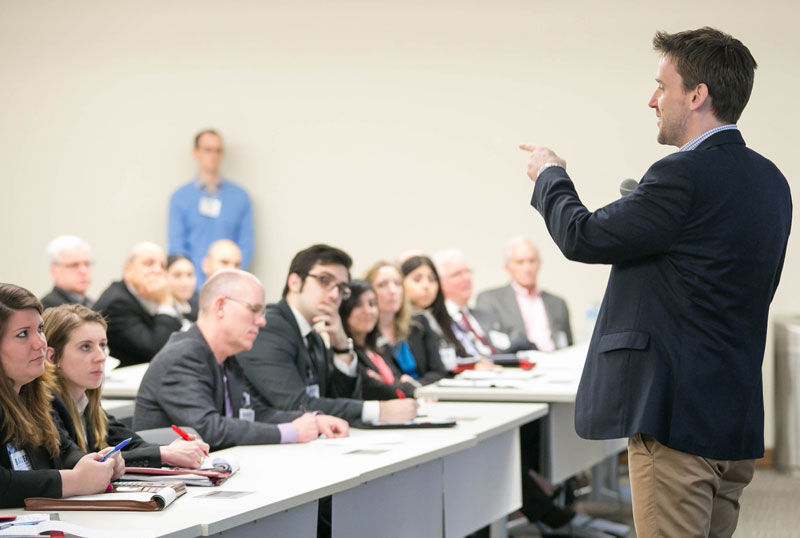Supply Chain Symposium Connects Research, Industry and Students
Event Focuses on Complexity in Supply Chain
Published on April 6, 2015

The Bauer Supply Chain Forum at the C. T. Bauer College of Business at the University of Houston hosted their Supply Chain Forum in March, bringing together industry professionals and students to discuss topics facing the industry.
Supply chain industry professionals connected to academic leaders and top students in the discipline in March at the Bauer Supply Chain Spring 2015 Symposium hosted by the Supply Chain Forum at the C. T. Bauer College of Business.
This year’s installment of the annual event included panel discussions and networking opportunities, with faculty from Bauer’s Department of Decision & Information Sciences leading sessions.
Presenters from Wilson Perumal & Company, including manager Chris Seifert and case team leader Scott Stallbaum, gave a keynote address that focused on the growth of complexity in the field, and how companies can handle the changing atmosphere of the supply chain domain.
“The world has changed,” Siefert said.
Siefert explained how technology, products, services, processes, organizations, regulations and markets have all become more complicated in recent years, making a point to clarify what complexity is.
“Complexity is the number of ways things can interact,” Siefert said. “(With) every new thing I add to the system, the more things it can interact with.”
Stallbaum then addressed the quantification of complexity in company, using a Square Root Costing formula for “properly allocating the costs of complexity.”
“Complexity costs follow a square-root-of-volume relationship,” Stallbaum said.
Siefert also noted the challenge of combatting complexity in business.
“Complexity creates a vicious cycle,” Siefert said.
According to Siefert, companies can deal with increasing complexity by understanding the sources and impacts of all types of complexity and eliminating non-value adding complexity. He aimed to create standardization and consistency within management systems by adopting a single management system.
Bauer supply chain senior Kaitlyn Redmond, who also serves as director of social events for Bauer Supply Chain Student Association (SCSA), attended this year’s symposium after having a positive experience at last spring’s event. Redmond said she was encouraged by her familiarity with topics that came up during the address, because it show that what is being taught in her supply chain courses reverberates the conflicts of the actual field.
“Overall, complexity is something that every company deals with in some way or another,” Redmond said. “By hearing the problems [in the symposium] that we hear about in class, we know that we can help.”
Daniel Mata, a senior, also took advantage of the opportunity to delve into the professional supply chain sphere.
“[The symposium] gives me insight on what’s expected and what companies are currently doing,” Mata said.
Both undergraduate and graduate students were invited to attend, getting to sit side-by-side with representatives with real field experience in companies and consulting firms around Houston.
After the address, audience members participated in a forum with a team of panelists, including Robert Howell, vice president of Supply Chain for Sysco; Steve Rhoden, director of Operations at Republic National Distributing; Brian Sallee, director of Planning, Logistics and AP Operations for Gulf States Toyota; and John Vogt, vice president of Logistics at Halliburton.
Bauer senior and SCSA Director of Corporate Relations Joshua Davis caught the end of the forum after a competition, and was immediately glad that he did.
“It spoke volumes to me,” Davis said. “The quality of the panel speaking was an invaluable experience — I had to take advantage of it.”
Polled industry representatives agreed with students, with a majority indicating that they were highly satisfied with the overall content, event length, time and location. Additionally, most said that they would like the Bauer College to continue to host the forum at least, if not more than, two times a year.
The Bauer College supply chain program is one of the largest in the nation, with more than 600 students majoring in supply chain management at the undergraduate level, plus a strong presence at the MBA and Ph.D. program levels.
To view the keynote presentation, and for information on further events from the Supply Chain Forum, click here.